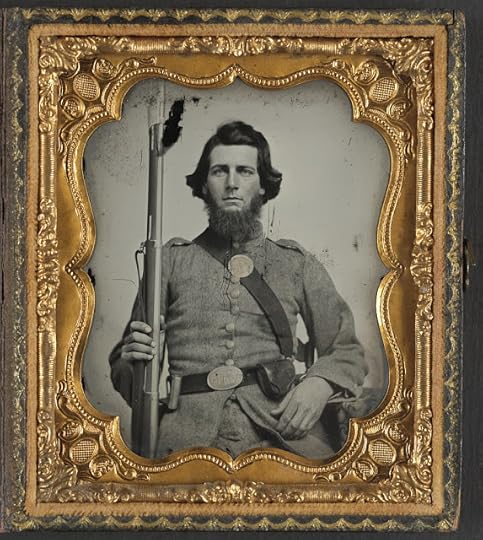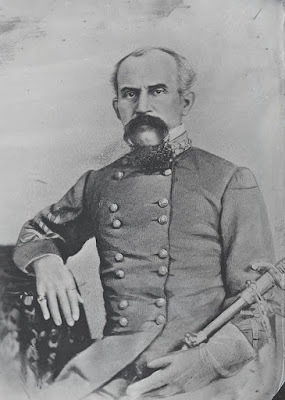Ready for more fighting if necessary: Freeman’s Ford to Chantilly with the 21st Georgia
The last week of August 1862 may have been the busiest in the history of the 21st Georgia Infantry's history during the Civil War. The Georgians fought in five separate engagements over the course of a little more than a week: Freeman's Ford on August 22nd, Manassas Station in the early morning hours of August 27th, Groveton on the evening of the 28th, Second Bull Run throughout August 29th and 30th, then Chantilly on September 1st.
The engagement at Groveton on the evening of August 28th against a portion of the Iron Brigade of the Army of the Potomac was a particularly hard fight for the regiment. "We carried 240 men into the engagement and advancing with our brigade, some became hotly engaged," one veteran recalled. "Onward we went to a fence, the enemy falling back before us. Whilst fighting here under a heavy crossfire, our regiment and the 21st North Carolina suffered unusually. Owing to some mistake, the 15th Alabama and 12th Georgia to our left were kept from firing and the enemy’s whole force became directed at us. Reinforced by the 26th Georgia and 61st Georgia of Lawton’s brigade, we charged across the fence, driving the enemy before us under appalling losses to ourselves. The enemy having retired to the woods and complete darkness now prevailing, we fell back to the fence when, after a few volleys, the firing ceased on both sides. Our loss on the memorable night of the 28th of August was very heavy as will be seen from the list of killed and wounded. We carried 240 men into the engagement and our wounded were so numerous that not more than a sixth of the regiment escaped unscathed."
This accountof the Second Manassas/Bull Run campaign, penned by an unknown soldier in the21st Georgia, first saw publication in the September 25, 1862,edition of the Atlanta Southern Confederacy.
 This image from the Liljenquist Collection depicts a private soldier wearing a Georgia state seal belt buckle.
This image from the Liljenquist Collection depicts a private soldier wearing a Georgia state seal belt buckle. Frederick City, Maryland
September 9, 1862
The numerousfriends of the 21st Georgia are doubtless anxious to know somethingof its engagements and losses in the recent battles and I propose to supplythis information to some extent.
We moved withour brigade (Trimble’s of Ewell’s division) from the Rapidan River when ourarmy under Lee commenced its forward movement and arrived at Freeman’s Ford onthe Hazel River. Here on the 22nd of August, we had a heavy skirmishwith the enemy who, in considerable force, had crossed and were about to attacksome portions of the army train. They had several brigades and a battery inposition.
Our brigade, consisting of the15th Alabama, 21st North Carolina, and our regiment underour gallant general, deployed skirmishers and advancing in line of battle, wedrove them over the river, killing and wounded a large number and causing themto fire their own trains on the other side. We killed, according to theirnewspaper accounts, the general commanding and, but for the river, would havecarried their battery. Having accomplished our purpose and having no artillery,we fell back to our original position. (To learn more about the fight atFreeman’s Ford from the Federal perspective, please check out “Standing LikePillars of Adamant: The 61st Ohio at Freeman’s Ford.”)
Next day we commenced the greatflank movement through Thoroughfare Gap and on the night of the 26th,after a toilsome march, arrived at Bristoe Station seven miles below and southof Manassas Junction where our division captured two trains of cars and manyprisoners. Already we had marched 20 miles that day but about 11 p.m. wecommenced a forced march to Manassas Junction in company with the 21stNorth Carolina, the two regiments under General Isaac Trimble. Arriving atManassas at 12:30 that night without cavalry or artillery support, and, findingthat the enemy was expecting us as their pickets fired into us, we formed inline and advanced into the village.
We had a short and quickengagement, the enemy opening on us with musketry and artillery. Fortunately,the darkness favored us and on we pushed, the 21st North Carolina onthe right and ours on the left. Becoming separated by a long line of cars, ourmovements were somewhat independent of each other. The conflict was short anddecisive. Our regiment took three pieces of artillery and some 50 prisoners inthe charge, including a lieutenant colonel, three captains, an adjutant, andthree lieutenants. The 21stNorth Carolina gallantly took two pieces of artillery during their charge. Animmense amount of stores, long trains loaded with goods of all kinds, sutler’sgoods, and supplies for Pope’s army all fell into our hands. This achievementwill ever be regarded by the 21st Georgia as one of its proudest.Our loss was very slight, considering the enemy had artillery in positionbesides their infantry.
We stood sleepless all night asthe campfires of the enemy were close around us and we learned from ourprisoners that they were in large force and much nearer us than our ownfriends. The sound of their artillery moving near us during the night alsoapprised us of our danger. It is attributable to darkness and their uttersurprise at our achievement that we were not attacked. Early the next morning,they were already advancing on us and shelling us when our division and theother troops arrived. We stood at rest in one of the old nooks and saw thebattle of that day including the magnificent cavalry fight between Stuart andthe enemy’s cavalry. (For a Federal perspective of that fight at ManassasJunction on August 27, 1862, please check out “Great Expectations Dashed: The Kanawha Division Meets the Army of the Potomac at Manassas Station.”)
 Brigadier General Isaac R. Trimble was wounded in the leg August 29, 1862 during the first day's fighting at Second Bull Run. He would be wounded in the leg again 11 months later while taking part in Pickett's Charge at Gettysburg. Trimble's wound was so severe that he was left behind at Gettysburg and spent the remainder of the conflict as a prisoner of war.
Brigadier General Isaac R. Trimble was wounded in the leg August 29, 1862 during the first day's fighting at Second Bull Run. He would be wounded in the leg again 11 months later while taking part in Pickett's Charge at Gettysburg. Trimble's wound was so severe that he was left behind at Gettysburg and spent the remainder of the conflict as a prisoner of war. The next day, by crossing BullRun at the bridge and again at the Stone Bridge, we arrived near Groveton onthe identical ground where we drilled one year ago and at nightfall becameengaged with Milroy’s forces. We carried 240 men into the engagement and advancingwith our brigade, some became hotly engaged. Onward we went to a fence, theenemy falling back before us. Whilst fighting here under a heavy crossfire, ourregiment and the 21st North Carolina suffered unusually. Owing tosome mistake, the 15th Alabama and 12th Georgia to ourleft were kept from firing and the enemy’s whole force became directed at us.Reinforced by the 26th Georgia and 61st Georgia of Lawton’sbrigade, we charged across the fence, driving the enemy before us under appallinglosses to ourselves. Here Captain Buck Waddail [Joseph F. Waddail] fell deadwhile Lieutenant [Thomas F.] Attaway of Co. B fell mortally wounded. Amongstthe foremost slain was Lieutenant Adderhold of Co. A.
The enemy having retired to thewoods and complete darkness now prevailing, we fell back to the fence when,after a few volleys, the firing ceased on both sides. Our loss on the memorablenight of the 28th of August was very heavy as will be seen from thelist of killed and wounded. We carried 240 men into the engagement and ourwounded were so numerous that not more than a sixth of the regiment escapedunscathed. (To learn more about the fight at Groveton, please check out thesethree posts from the Iron Brigade: “How the Iron Brigade was Wrought" (2ndWisconsin), "A Baptism at Groveton" (19th Indiana), and “I Don’t Thirst for More Fight” (6th Wisconsin).
On the 29th, Major [ThomasC.] Glover, with the fragments of the regiment, fell into line and in theskirmish of the morning where General Trimble was wounded, he was present. Detailedin the afternoon to bury our dead, we were unengaged anymore that day. On the30th, we rejoined our brigade. Not numbering more than 40 men, wetook part in the brilliant success of that day and with our brigade sustainedand repelled the shock of three lines of battle thrown on our position withgreat energy and determination by the enemy. The dead on all the fields inwhich we had been engaged illustrates our fighting. At the close of this fight,the enemy was in full retreat. Our losses had been very heavy and most of theregiment was scattered in all directions, wounded and suffering for medicalattention. Major Glover was detailed by General Lawton as a physician to attendthem temporarily and leaving the command with Captain [William M.] Butt of Co.A, he went on his mission on the 31st.
The little command again movedwith the division to intercept the enemy between Centreville and Fairfax. NearChantilly, we were engaged again on the evening of September 1st.Our loss was not many, but the lamented Captain Butt fell here. Since then, wehave not been engaged but have crossed the Potomac and are now at Frederick,Maryland, a good deal recruited in numbers and ready for more fighting shouldit be necessary. Major Glover rejoined us at Leesburg.
Source:
Letter from unknown soldier in 21st GeorgiaInfantry, Atlanta Southern Confederacy (Georgia), September 25, 1862,pg. 2
Daniel A. Masters's Blog
- Daniel A. Masters's profile
- 1 follower



